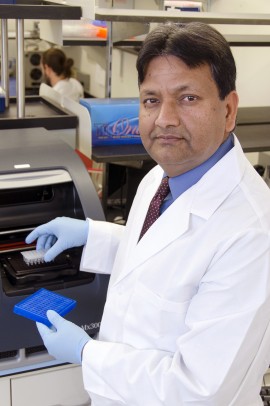UIC to study how adolescent binge drinking impacts adult behavior
By Sharon Parmet
The University of Illinois Chicago has received $4.5 million in continuation funding from the National Institute on Alcohol Abuse and Alcoholism to support the UIC site of the national Neurobiology of Adolescent Drinking in Adulthood, or NADIA, consortium.

The UIC site is led by Subhash Pandey, professor of psychiatry and director of the Center for Alcohol Research in Epigenetics at UIC. He also will serve as a scientific director of the overall NADIA consortium.
The mission of the consortium is to study how adolescent binge drinking affects genes, brain circuitry, and behaviors through epigenetics — chemical changes to DNA, RNA or proteins that alter the expression of genes without directly modifying them. This funding, which is a renewal of funding from the NIAAA first awarded in 2010, will support the consortium for five years.
“This new funding will allow us to continue our investigations into how binge drinking in adolescence causes epigenetic changes and impacts physical and mental health, including addiction, later in life,” Pandey said. Research goals for the consortium include identifying neurobiological changes that result from early binge drinking and investigating the role of abnormal epigenetic processes in the amygdala, which increases the risk for adult psychopathology such as anxiety as well as alcohol use disorders.
“This may be related to epigenetic reprogramming in the brain, as epigenetic processes refine the brain maturation process,” said Pandey, who also is a senior career scientist at Jesse Brown VA Medical Center. New research will link enduring epigenetic changes to functional changes in the brain and related behaviors emerging from adolescent alcohol exposure in adulthood.
The funding also will support the development of core scientific resources for the consortium and will provide expertise and molecular tools to other alcohol researchers for investigating the biological basis of adult psychopathology linked to adolescent drinking. The University of North Carolina, Duke University, the Medical University of South Carolina, Binghamton University, and Louisiana State University are other members of the NADIA consortium.
Researchers supported by this grant will work together to develop epigenetic editing tools that can potentially correct abnormal epigenetic markers that influence genes expressed in the brain with the hope that editing may help normalize neurobiological and behavioral changes in adulthood after adolescent alcohol exposure, explained Pandey.
Other UIC researchers who will be part of NADIA consortium include Amy Lasek, associate professor of psychiatry; Mark Maienschein-Cline, director of the research informatics core at the UIC Research Resources Center; Dennis Grayson, professor of molecular neuroscience; Huaibo Zhang, research assistant professor of psychiatry, and John Peyton Bohnsack, a postdoctoral research associate in the department of psychiatry.
